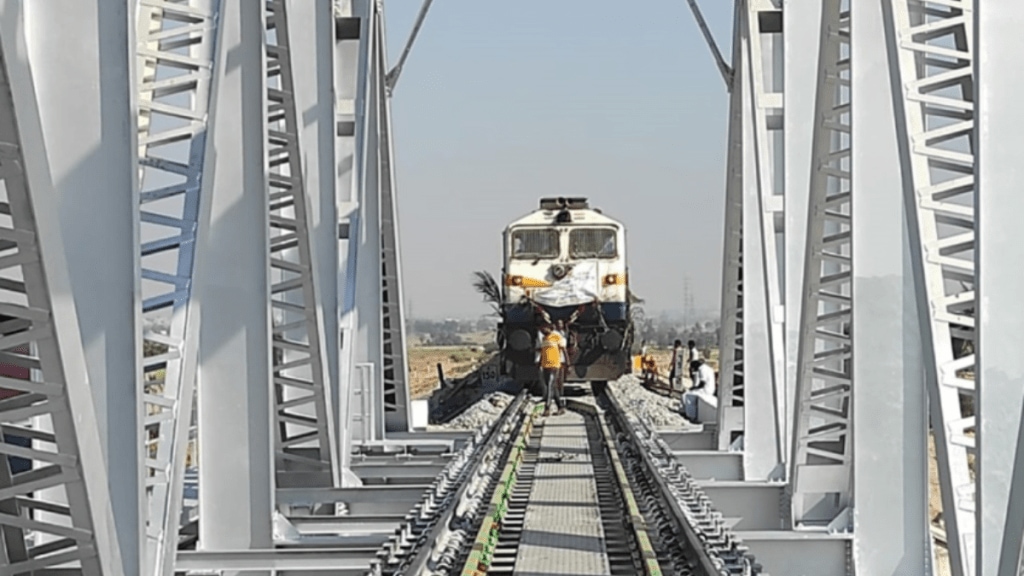Indian Railways is playing a crucial role in advancing Maharashtra’s economic infrastructure through various projects. With a massive investment of Rs 1,64,605 crore, the national transporter is undertaking transformative projects to enhance the state’s transportation network. The Union Budget 2024-25 alone allocated Rs 15,940 crore to Maharashtra’s rail infrastructure, which is a significant increase from Rs 1,171 crore allocated between 2009-14, reflecting the government’s commitment to modernization and development.
Ongoing Railway Projects in Maharashtra
Indian Railways is currently managing 41 ongoing projects across Maharashtra, covering a total of 5,877 km at an estimated cost of Rs 81,580 crore. These projects include new rail line construction, line extensions, doubling of existing tracks, gauge conversions, and electrification works. These infrastructure upgrades are expected to improve connectivity, boost economic growth, and reduce travel times, providing enormous benefits to both passengers and industries.
Amrit Bharat Stations Scheme (ABSS)
The Amrit Bharat Stations Scheme (ABSS) is another key initiative by Indian Railways aimed at upgrading 1,337 railway stations across the country, with 132 stations in Maharashtra currently undergoing redevelopment at a cost of Rs 6,411 crore. Stations like Parel, Nashik Road, Jalna, and Igatpuri are being transformed to enhance the passenger experience with improved amenities such as waiting halls, escalators, toilets, and executive lounges. The long-term vision is to modernize stations into multi-modal transport hubs.
Road Over Bridges (ROBs) and Road Under Bridges (RUBs)
To improve safety and mobility, Indian Railways is working on constructing 318 Road Over Bridges (ROBs) and Road Under Bridges (RUBs) across Maharashtra at Rs 5,615 crore. These bridges are being built to eliminate manned level crossings, reducing accidents and enhancing train operations. Major projects include those at Niphad, Diva, and Phulgaon.
Dedicated Freight Corridor (DFC) Project
The Dedicated Freight Corridor (DFC) project, part of the Western DFC, spans 178 km through Maharashtra’s Thane, Raigad, and Palghar districts. With an investment of Rs 12,697 crore, this freight corridor will provide improved connectivity to the Jawaharlal Nehru Port Trust (JNPT) and boost cargo and container traffic between the port and the Delhi-NCR region. It is expected to enhance the state’s logistical capabilities and support industrial growth.
Key New Projects
Ajanta Caves Rail Connectivity Project
The Ajanta Caves Rail Connectivity project, with an estimated cost of Rs 7,106 crore, will develop a 174-km rail line from Jalna to Jalgaon. This project is expected to create 60 lakh man-days of employment and reduce carbon emissions by 54 crore kilograms, supporting both environmental sustainability and economic growth. The project will also promote tourism by improving access to the UNESCO World Heritage Site of Ajanta Caves.
Manmad-Indore New Line Project
The 309-km Manmad-Indore New Line project, costing Rs 18,036 crore, will connect important industrial and agricultural hubs in Maharashtra and Madhya Pradesh. The project will boost logistics and enhance regional connectivity, benefitting farmers and industries by providing faster transportation for goods like onions and other agricultural products. Moreover, the new line will shorten the distance between major pilgrimage sites like Ujjain’s Mahakaleshwar Jyotirlinga and Nashik’s Trimbakeshwar Jyotirlinga, promoting religious tourism.
Indian Railways’ Achievements in Maharashtra
Between 2014 and 2024, Indian Railways achieved significant milestones in Maharashtra, including 100% electrification of the state’s 3,513 km of rail lines, the construction of 1,830 km of new tracks, and the development of 929 Road Over and Under Bridges. Additionally, the “One Station One Product” initiative, which promotes local products, has been implemented in 218 stations.
The massive investments in railway infrastructure by Indian Railways are set to reshape Maharashtra’s economy by improving connectivity, boosting industrial growth, and enhancing the overall transportation network. These initiatives, ranging from new projects to the modernisation of stations, are not only poised to transform the state’s logistics and passenger services but also promote sustainable and inclusive growth.

